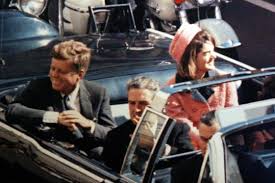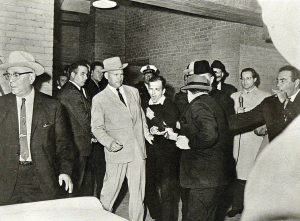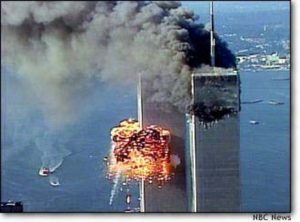By Suzanne Sparrow Watson
 Inflection points – events that not only change the course of history but our collective psyche as well. For many of us the first such event was the Kennedy assassination. Prior to November 22, 1963, we were a nation energized by a young President with fresh ideas and plans – plans that were to be carried out by those “born of a new generation”. When JFK was cut down it was shocking and unnerving. And, one could argue, changed who we are. There is a much-quoted conversation that took place after the assassination between journalist Mary McGrory and Daniel Patrick Moynihan, then assistant secretary of labor. She lamented, “We’ll never laugh again.” He replied: “Mary, we’ll laugh again. It’s just that we’ll never be young again.” Many hopes and dreams died that day, as well as our collective feeling of security and our way of life. As some sociologists have noted, November 22, 1963 was the end of the Fifties.
Inflection points – events that not only change the course of history but our collective psyche as well. For many of us the first such event was the Kennedy assassination. Prior to November 22, 1963, we were a nation energized by a young President with fresh ideas and plans – plans that were to be carried out by those “born of a new generation”. When JFK was cut down it was shocking and unnerving. And, one could argue, changed who we are. There is a much-quoted conversation that took place after the assassination between journalist Mary McGrory and Daniel Patrick Moynihan, then assistant secretary of labor. She lamented, “We’ll never laugh again.” He replied: “Mary, we’ll laugh again. It’s just that we’ll never be young again.” Many hopes and dreams died that day, as well as our collective feeling of security and our way of life. As some sociologists have noted, November 22, 1963 was the end of the Fifties.
 The assassination changed us in ways we could not have predicted at the time. After that, Americans increasingly distrusted the Federal government (particularly after publication of the Warren Report) and yet, ironically, it also precipitated the largest expansion of government into our everyday lives. We became embroiled in a war that many argue Kennedy would not have supported and our culture was flush with sex, drugs and a whole lot of anger. Of course, there were good changes as well – civil rights and the women’s movement to name two – but certainly the innocence of the prior decade was gone forever. It also marked the rise of television over newspapers. Everyone was glued to black and white screens, watching events unfold for three days. And why not? It was compelling and the only way to stay abreast of changing events. For me, I remember watching Lee Harvey Oswald being escorted down that fateful corridor in the Dallas police station when Jack Ruby shot him. The experience of seeing someone killed in real time was jarring and disturbing. Millions of people experienced that same shock. Coupled with the assassination, how could we not be affected going forward?
The assassination changed us in ways we could not have predicted at the time. After that, Americans increasingly distrusted the Federal government (particularly after publication of the Warren Report) and yet, ironically, it also precipitated the largest expansion of government into our everyday lives. We became embroiled in a war that many argue Kennedy would not have supported and our culture was flush with sex, drugs and a whole lot of anger. Of course, there were good changes as well – civil rights and the women’s movement to name two – but certainly the innocence of the prior decade was gone forever. It also marked the rise of television over newspapers. Everyone was glued to black and white screens, watching events unfold for three days. And why not? It was compelling and the only way to stay abreast of changing events. For me, I remember watching Lee Harvey Oswald being escorted down that fateful corridor in the Dallas police station when Jack Ruby shot him. The experience of seeing someone killed in real time was jarring and disturbing. Millions of people experienced that same shock. Coupled with the assassination, how could we not be affected going forward?
 The next time I saw anyone murdered was sixteen years ago today – September 11, 2001. I flipped on CNBC that morning while getting ready for work. The first plane had already hit Tower One and the hosts were speculating that it was a freak accident. They mused about whether it would have an affect on the stock market since so many trading firms were in that building. Then the unimaginable happened – the second plane hit. I watched it in horror; this time it wasn’t one person I saw killed, but thousands. Thanks to the 24 hour news cycle we were all witness to explosions and fire and falling bodies over and over again for weeks. I’m not sure we yet fully understand the toll that it took on us. Surely our national mindset was altered after watching all of the carnage and grief. A grief that I believe is still evident after all these years.
The next time I saw anyone murdered was sixteen years ago today – September 11, 2001. I flipped on CNBC that morning while getting ready for work. The first plane had already hit Tower One and the hosts were speculating that it was a freak accident. They mused about whether it would have an affect on the stock market since so many trading firms were in that building. Then the unimaginable happened – the second plane hit. I watched it in horror; this time it wasn’t one person I saw killed, but thousands. Thanks to the 24 hour news cycle we were all witness to explosions and fire and falling bodies over and over again for weeks. I’m not sure we yet fully understand the toll that it took on us. Surely our national mindset was altered after watching all of the carnage and grief. A grief that I believe is still evident after all these years.
To this day many of us tear up when recalling the image of the Twin Towers collapsing. It remains hard to think about the people who perished that day – people who left home for work on a bright, blue-sky Tuesday morning and never returned. The very notion of that was – is – frightening and causes us, once again, to question how secure we really are. The fear of an imminent terror attack began impacting our everyday lives that day. Suddenly we had to remove our shoes at the airport and limit the amount of shampoo we carry on a plane. Socially, it brought on a lot of change too. For the first few months after 9/11 it seemed we were able to put our differences aside, but that fraternity soon dissipated and has now devolved to a point where divisiveness rules the day . In many ways, it has been the 60’s all over again with an extra dose of anger thrown in.
Which brings me to the unintended consequences of 9/11. At some level we live with fear on a daily basis – fear that it could happen again to us or someone we love. We witness repeated terrorist attacks carried out all over the world that target ordinary people doing ordinary things. I believe that the discord in our society is, in part, a manifestation of that fear. I hope at some point we can recapture the unity we had in the aftermath of 9/11 and once again pull together. Hurricane Harvey, as devastating and heart-breaking as it’s been, has shown me that people really can come together when fellow citizens are in need. Sandra Bullock put it best when she Tweeted: “There are no politics in 8 feet of water. There are human beings in 8 feet of water.” Amen. Maybe this is a new beginning. A new inflection point that causes us to remember that more often than not, most of the time we’re all just human beings in 8 feet of water.
You nailed it, again! Thank you for always brightening my Mondays and putting every day life into perspective. ❤️❤️❤️
Thanks Leez. I sure do miss you – it is not going to be the same this year without you. But sure do love seeing the pictures of your little ones. You are one lucky girl!
Always, always love your reflections/inflections/pearls of wisdom. Thank you for being my soulmate — yet from afar.
So glad you enjoyed it. We have to stick together, D!
We will never Forget!
No we won’t, Judy! Thanks, as always, for your comment.
Well said Suzanne ! Thank you.
Thanks, Phyllis!
Your “inflection points” are right on the money, Sue. The Kennedy assassination changed me and my mindset about the world in which we live. During my reading of the Warren Report, I was stunned by the applied “science” that seemed to defy the laws of physics. Even my Boy Scout knowledge of ballistics could see the “magic bullet” theory didn’t hold water.
So, I began investigating alternative narratives that applied more critical thinking and logic to the situation and was branded a “conspiracy theorist” for my efforts. The moniker was created by the CIA to be used to denigrate anyone not believing the official narrative.
Fast forward to 9/11. What I saw defied belief. Three steel framed buildings crashing to the ground at freefall speed. This is the only time in history that has ever happened. According to our standard physics models, that does not occur unless the inner support beams are all weakened or damaged by heat far greater than that of jet fuel. Again the conspiracy theorist moniker is bandied about denigrating the highly professional analyses by architects and engineers studying the videos and still images.
I didn’t choose this path, it chose me as I have spent most of my working life as a computer and systems analyst. Yet, I still believe in the goodness of ordinary people helping out in dire situations as I have done many times before and will continue to do. What becomes of us will be determined by us and no one else. Will we continue believing official narratives that defy the laws of physics or will we look deeper into the data and discover nuggets of truth that can set us free?
Agree – there is LOTS to be skeptical about, Burt. I appreciate your comment, as always.
Well said, it is a heart felt reminder of our history.
Thanks, Kay. I appreciate your comment.
A beautiful and heartfelt reminder!
Thanks, Janet. I so appreciate your commments…and you!